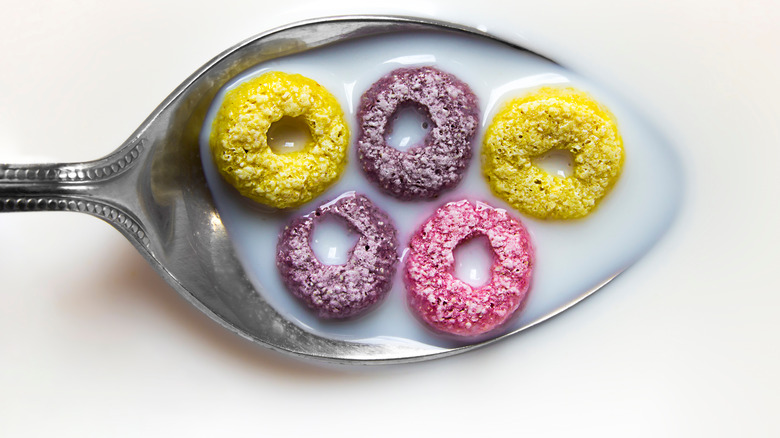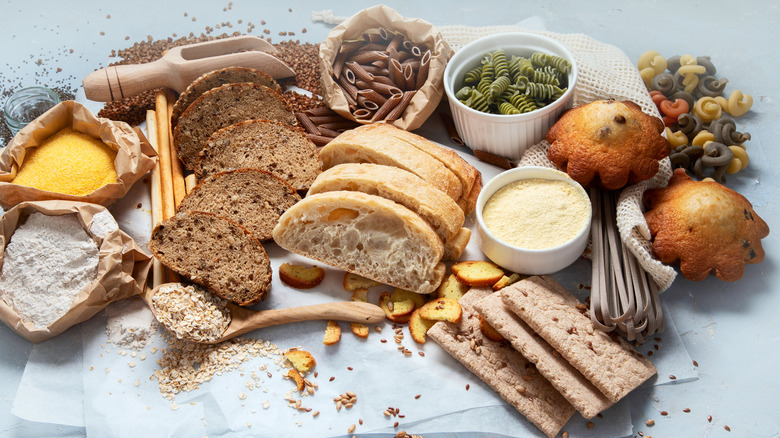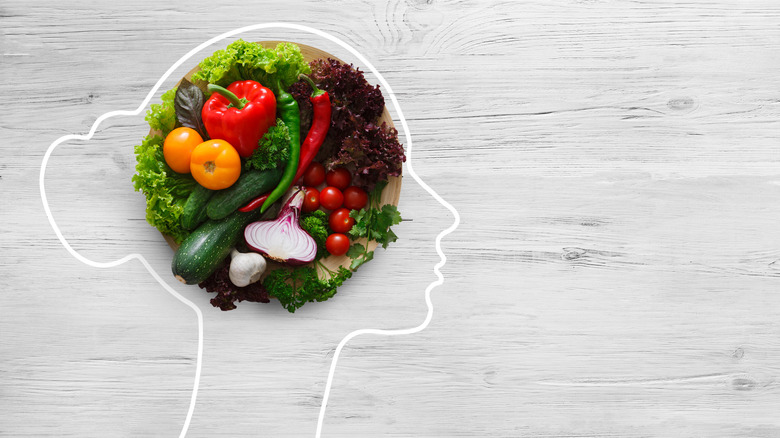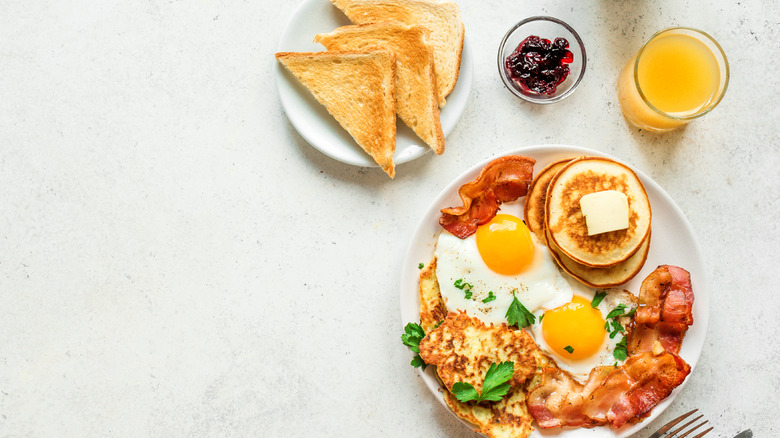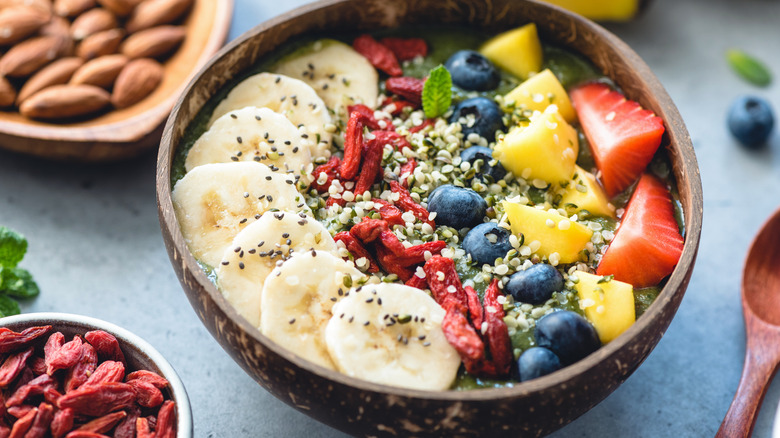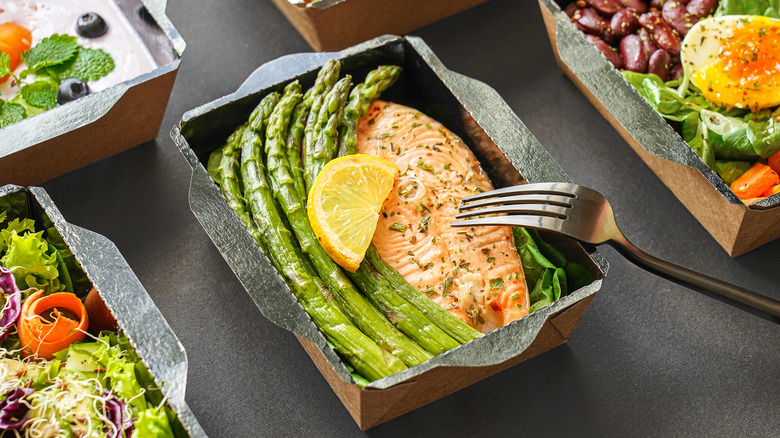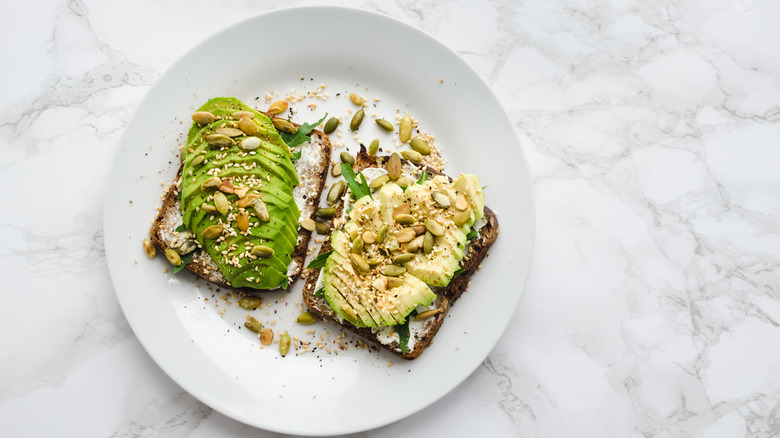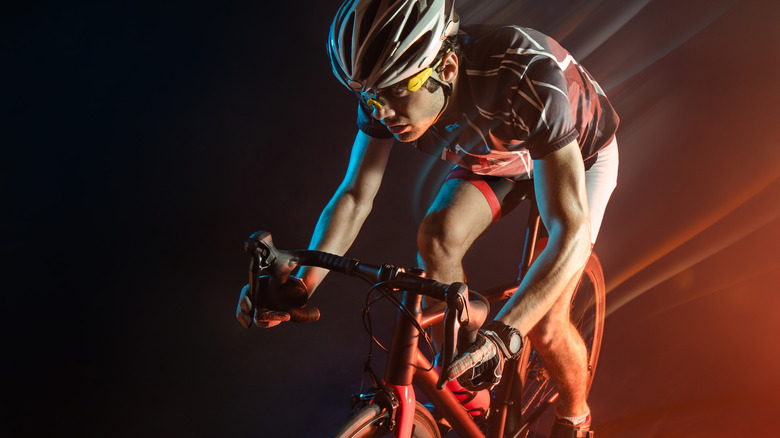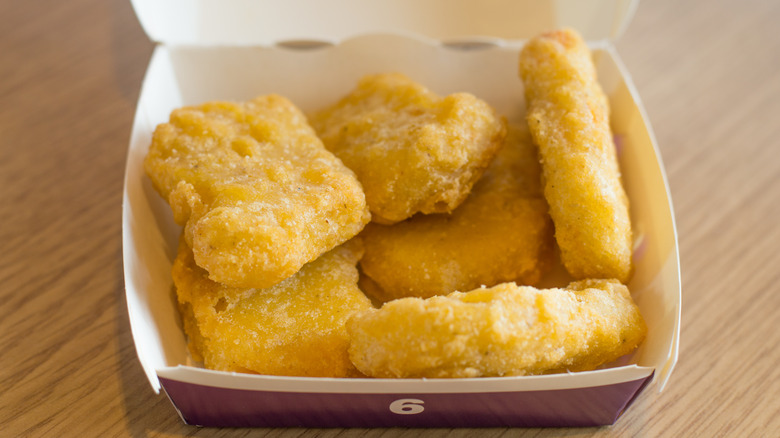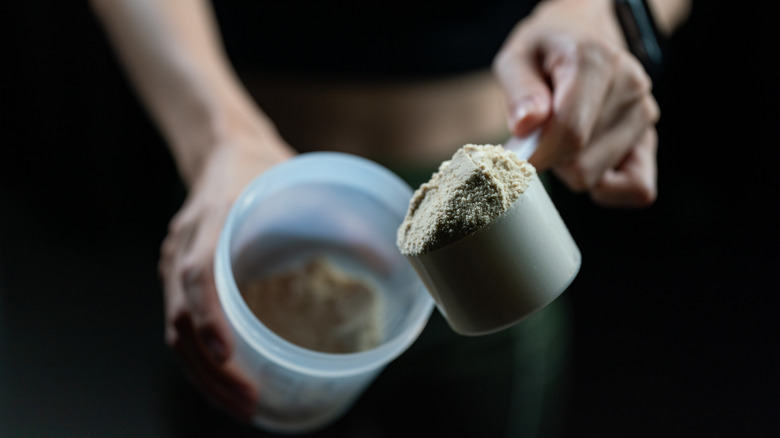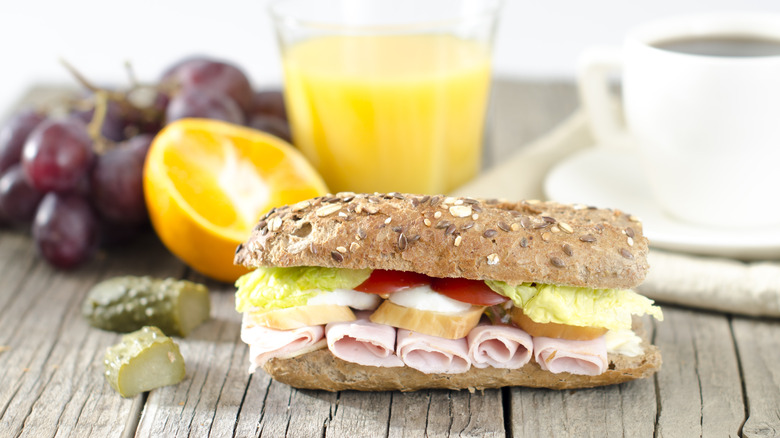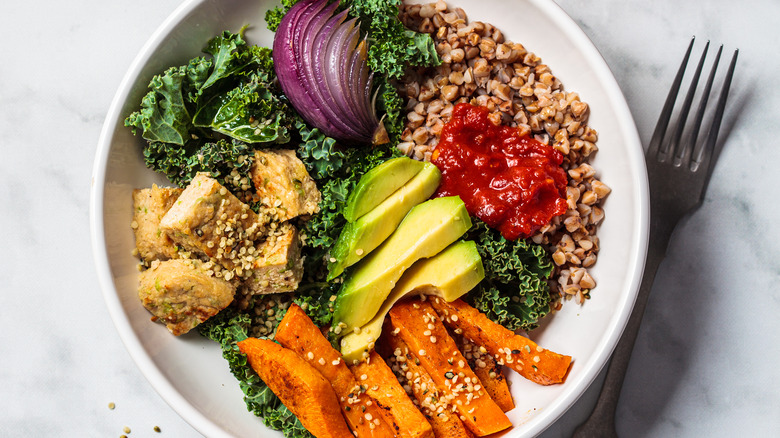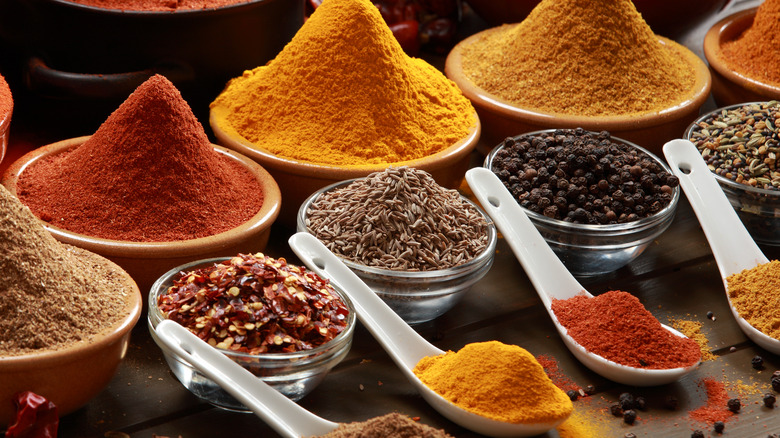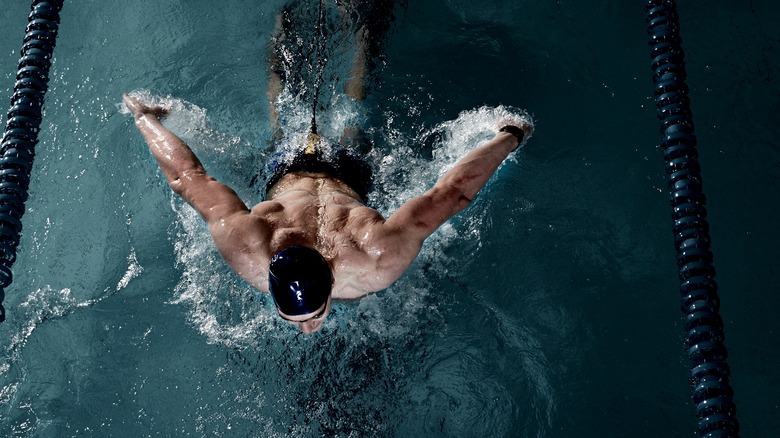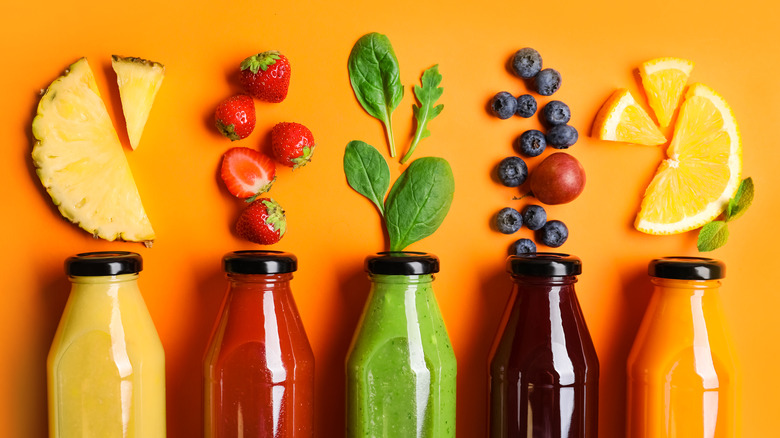What Olympic Athletes Actually Eat In A Day
Olympic athletes undoubtedly have their own health and fitness routines that differ from their teammates and other types of athletes. Still, there are some notable similarities in the way that Olympians eat, from worrying less about calories and more about protein to following diet plans to get as many nutrients in as possible. And don't even think about skipping meals (especially breakfast) if you're in training. But what should athletes eat, according to nutritionists?
Several of them spoke with Shape to give some insight into the best possible dietary features for Olympic athletes. Dan Benardot, director of the Laboratory for Elite Athlete Performance at Georgia State University, explained, "One of the biggest mistakes athletes make is heading out for a run in the morning without eating anything first." Amanda Carlson-Phillips, vice president of nutrition and research for Athletes' Performance, added that athletes need to make sure they're staying hydrated by drinking between ½ to one ounce of water per pound of weight each day. And sports nutritionist Dawn Scott revealed that getting plenty of iron is a must because iron deficiency can increase injury risk.
While many Olympians surely follow these basics, some of your favorites may have diets that surprise you.
Some Olympians load up on carbs and calories
At the height of his career, Michael Phelps was at the center of a rumor that he consumed an unbelievable 12,000 calories per day to keep him on top of his swimming game. However, Phelps debunked that rumor in a conversation with Men's Health, stating, "One random paper picked it up over in London and made this fabricated lie. Twelve thousand is not real. It's impossible. You can't eat that much." Still, Phelps did admit to eating 8,000 to 10,000 calories per day when he "was in high school and still growing."
In more recent years, Phelps has shed some light on what an Olympic training diet actually looks like. Inside the Games reported that Phelps recovered from the 2016 Olympics by loading up on carbs and calories with a heaping plate of pasta. "I think I had a pound of spaghetti, and I am not a spaghetti fan. I forced myself to eat it," said Phelps.
Heptathlete Katarina Johnson-Thompson also says that carbs are a must. "I train six times a week, sometimes twice a day, so I can't afford to cut back on carbs. I am very much of the view of everything in moderation; you can't cut out a major food group," she told Cosmopolitan.
Many Olympic athletes avoid counting calories
While some athletes focus on getting the right amount of calories for energy, others focus more on nutrients than calorie-counting. Katarina Johnson-Thompson told Cosmopolitan, "Calories aren't a thing. I make sure I get so many grams of carbs and so many grams of protein in per day."
She's not alone. Two Olympic skiers, Resi Stiegler and Ted Ligety, spoke with ABC News before the 2018 Winter Olympics to shed some light on their diets. Both agree that what they eat is more important than the calories they consume. Stiegler, especially, watches the type of food she puts in her body because she has celiac disease, so gluten is a no-go. Instead of counting calories, Stiegler loads up on healthy fruits, vegetables, and sugar-free foods.
For Ligety, it's all about the nutrients. "We definitely try to eat more food than less food," he explained. "I try to eat really healthy, a high-protein diet with lots of vegetables."
They're sticklers for a healthy breakfast
Breakfast is often touted as the most important meal of the day, and it seems that many Olympians would agree with this tried-and-true sentiment. In fact, Olympic gymnast Shannon Miller told Real Simple, "You don't have to be training for Olympic gold to realize what a difference a solid breakfast can make to your day. Growing up, breakfast was always important and remains so today for both me and my family." On a typical morning, Miller fixes herself some eggs and a smoothie to ensure that she gets the proper fuel for the rest of the day.
In the same article, gold medalist Gabby Douglas explained that breakfast is a must for getting the energy boost she needs for training. "The morning of my Olympic meets, I ate scrambled eggs with wheat toast and fruit. It was critical to fuel my body for the long day ahead," said Douglas. "I certainly didn't want to lose energy halfway through the competition!"
They make a big meal for breakfast
Not only is breakfast a no-brainer for many of today's top Olympic athletes, but it seems that it's also often their biggest meal of the day, something that many of us reserve for dinner time. Chloe Kim, an Olympic snowboarder, admitted to eating a lot of stuff for breakfast — and it's probably not what you'd expect. Kim told PopSugar that her typical breakfast is "chocolate pancakes, some biscuits and gravy, toast, and cottage cheese." Kim also says that she gets up at 7 a.m. to make sure she has time for a big breakfast.
There may actually be some science behind filling up on breakfast foods. According to a 2020 article published in The Journal of Clinical Endocrinology & Metabolism, researchers found that high-calorie breakfast meals can more than double the body's metabolism compared to the same meal eaten at dinner. Additionally, those who ate low-calorie breakfasts felt hungrier during the day. Maybe Olympians are onto something?
Olympians sometimes look to meal delivery services for balance
It can be challenging for athletes in training to keep up with their meals when they're working out for several hours a day. Olympians often have demanding training schedules leading up to the Olympic games, often not taking much of a break in between them. Fitting in meals can be a challenge, so it's not surprising that some Olympic athletes turn to convenient meal delivery services when they're in a pinch for a healthy meal.
Lindsey Vonn is one of them. The Olympic skier told Women's Health that her lunch and dinner often come from one of her favorite meal services, both for convenience and health. "If left to my own devices, I'd probably have mac and cheese and pasta and cereal," Vonn admitted. "I need everything to be laid out for me; otherwise, I divert quickly." Chicken or salmon with kale is a go-to lunch for Vonn, while dinner is usually a chicken salad or a plant-based meal.
They focus on protein and fiber
Carbs and calories might top some Olympic athletes' nutritional lists, but others prefer to place their sights on protein and fiber. Protein helps build and repair muscles, and fiber enables you to break down and digest the foods you eat. Therefore, fiber is an essential nutrient that makes sure you're getting all the other nutrients you need out of your food (via Muscle & Fitness).
Olympians Jessie Diggins and Alex Shibutani spoke with Buzzfeed about their usual training-ready diets. Both mentioned protein and fiber as two key nutrients they always make sure they get plenty of. Protein is a breakfast staple for Shibutani, who said, "On training and competition days when I have enough time, I get some egg whites, chicken or sausage, fruit, and some orange juice." And Diggins makes sure her snacks are rich with protein, including yummy options like avocado toast, a protein-packed muffin, and Greek yogurt.
Some Olympic athletes listen to what their bodies need
Some Olympic athletes, like decathlete Ashton Eaton, tune into their bodies to guide what they eat. Eaton told GQ in a 2016 interview that he used to eat whatever he wanted, not paying much attention to the nutritional value of his meals. However, he's since switched to an overall healthier diet by being mindful of carbs and fat. Something that helped Eaton make the transition was listening to how his body responded to food. "I think that as you grow, your tastes adapt to what your body needs, for some reason," said Eaton. "My body will tell me what it needs."
Oksana Masters, a Paralympic cyclist, also believes her body lets her know when it needs something. In a Bicycling essay, Masters wrote, "I try to make sure I'm eating enough and not getting so caught up in the 'how many carbs am I eating' kind of things. My philosophy is just that if your body's craving it, that means you need it for a reason."
Some don't mind splurging at times
Even if you're an Olympic athlete, that doesn't mean you can't splurge once in a while. From loading up on chicken nuggets to partaking in their favorite cheat meals occasionally, Olympians don't deprive themselves of yummy foods — even if those foods are not the healthiest options.
Usain Bolt, one of the fastest human beings alive, admitted to averaging about 100 McDonald's Chicken McNuggets each day when he was in Beijing for the 2008 Olympics (per Time). His reason? He simply wasn't a fan of native foods in Beijing, so he loaded up on comfort food instead.
Simone Biles also told Women's Health that she has some alcohol on her days off, which are usually weekends. Other Olympic athletes told Boston.com that their cheat days consist of chocolate, cheeseburgers, and more. "A lot of us sometimes go out for ice cream every once in a while, every two weeks or something," said hockey player Brianna Decker.
They eat around their workouts
Sometimes, Olympians prioritize workouts by squeezing them in when they can and fitting their meals around their exercise routine. Although it doesn't seem like the most reliable way to get your nutrients in for the day, it seems to work for busy athletes, like Simone Biles, who train for hours each day.
In a Women's Health interview, Biles explained that she eats without tracking calories or nutrients because she lets her body do its thing at the gym — and she works super hard while she's there. For her, maintaining a healthy relationship with food is important, so she makes sure she fuels her body correctly before and after her workouts.
Biles grabs a protein shake after training, sometimes splitting one up between workout sessions. When practice ends around 11 a.m., she's ready to order some lunch, and she wraps up her evening training with dinner at home or at one of her favorite restaurants.
Snacking is an Olympian's best food secret
Olympians don't just live off healthy breakfasts, lunches, and dinners. Snacks are also an important part of their diet. According to MedlinePlus, eating a few healthy snacks during the day can boost your energy levels and keep you from feeling super hungry in between meals, so snacking can actually be a healthy way to keep yourself moving throughout the day.
Active asked several Olympic runners what they prefer to eat on their big race days, and snacks were on almost everyone's list. Alysia Montano, for example, eats nuts or fruit for a morning snack, while a peanut butter and jelly sandwich is her go-to afternoon snack. Dawn Harper-Nelson reaches for seaweed snacks or dried fruit before she races, and turkey jerky is one of Jeremy Taiwo's favorite pre-race snacks.
Desiree Linden also stresses the importance of fueling up after a race. "I find it difficult to get in food right away after a marathon, yet it's super critical for recovery. I always pack a PowerBar Protein Plus bar for immediately after the race and try to get that in within the first 30 minutes of crossing the line," she told Active.
Some go vegan or vegetarian
Protein is obviously a crucial nutrient for athletes to get into their systems daily, but who says it needs to come from meat? Some of your favorite Olympic athletes have switched over to a plant-based way of living by adopting a vegan or vegetarian diet.
Tennis pro Venus Williams is one of them, switching to a vegan diet after being diagnosed with an autoimmune disease. Williams told Health, "Once I started, I fell in love with the concept of fueling your body in the best way possible. Not only does it help me on the court, but I feel like I'm doing the right thing for me." Snowboarder Hannah Teter is another Olympian who moved away from meat. She explained that it was her love for animals and "the slavery of the dairy industry" that convinced her to "go more vegan" (via HuffPost).
Martina Navratilova was one of the first Olympic athletes to make headlines with her adoption of a plant-based diet. In 2009, she said, "I ... believe that my moving toward a more plant-based diet was the major reason that I was able to continue playing professional tennis through my 40s."
They add new flavors to keep things exciting
Olympic athletes train and travel a lot, so meals and snacks often need to get squeezed in between. Unfortunately, this can lead to humdrum meals, especially for athletes who meal prep and eat almost the same dishes each day. Fortunately, traveling gives these athletes the ability to experience new cultures. And with culture comes flavor, something Oksana Masters enjoys adding to her meals to make them more enticing.
For Masters, adding in traditional cooking flavors from the places she's visiting is a way to get her used to experiencing new tastes and foods while keeping her meals exciting. Masters told Bicycling, "With the Olympics in Tokyo, I've been staying motivated by adding Japanese seasonings to my food. I use a lot of Japanese sesame oil. So when I cook my eggs, I make sure to put sesame oil in." She also said that one of the secrets to making good borscht — her go-to meal on the road — is adding a little dill in for flavor.
They change their diets leading up to competitions
How an Olympic athlete eats most of the time isn't always the same as how they eat in the weeks leading up to their big competitions. For many athletes, it seems that the closer they get to the Olympic games, the more they tweak their diets to accommodate their performance needs.
Several Olympians shared with Delish their diet secrets leading up to the Tokyo summer games in 2021. Some of them followed a similar pattern in that their pre-competition diets are more strict than their usual diets. For example, Paralympic swimmer Mallory Weggemann says, "Going into a Paralympic Games, I notice that about six months prior, my intake needs increase to sustain the increase in intensity of training. I also go dry, cutting alcohol out. While I don't normally drink much, this small shift aids in better sleep, recovery, and hydration." And BMX racer Alise Willoughby revealed, "I do take into account digestion times and try to have any red meat at least two days before and then white meat or pasta the nights before/during competition."
Many Olympians have transitioned to less processed diets
Some Olympians indeed admit to having their share of cheat meals and eating the foods they love, regardless of whether it's training time or not. But, according to nutritionists who spoke with Vox, many athletes are transforming what they eat for the better. Switching to a healthier diet seems to have become the norm in the world of Olympians.
"I did not see many of the Michael Phelps–style anything-goes diets," said sports nutritionist and trainer Matt Fitzgerald of his travels to multiple countries to study the diets of top-performing athletes. "And that seems to be fairly recent evolution over the last two generations of athletes. Although they eat everything, they skew toward the highest-quality food types — natural and unprocessed."
Asker Jeukendrup, a sports nutritionist who's worked with Olympic athletes, agrees. "There's been a change in the last few years where athletes have become more serious about thinking about what they're putting into their bodies," Jeukendrup told Vox. "The differences between winning and not winning are becoming smaller and smaller, and more and more athletes are becoming serious about nutrition."

